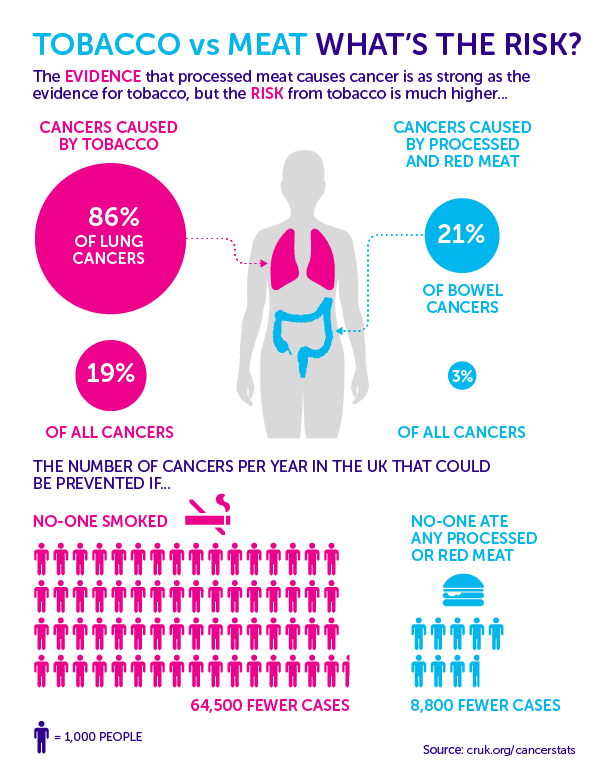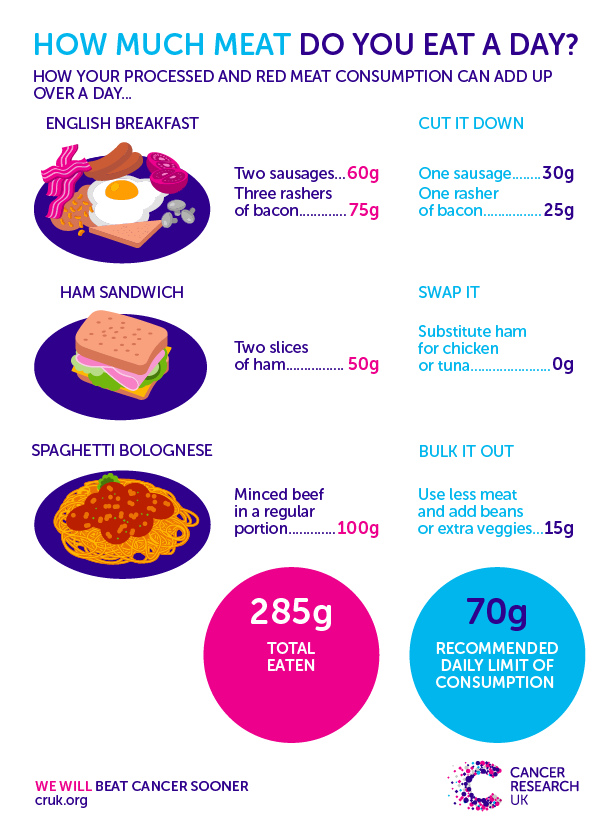In October 2015, news broke that processed meats had been classified as carcinogenic to humans. This, understandably, caused a certain amount of consternation in all those countries in which sausages are enjoyed (I can already see this post is going to have an issue with double entrendres, for which I apologise…!). But, in reality though, can processed meats cause cancer?
As ever, it seems; it’s complicated!
Before I even think about a meaningful answer, I need to explore a couple of things:
- Where did this news come from and is it credible?
- What is actually meant by, ‘processed meats’?
- What is the actual risk to us, in terms of consumption?
Firstly, then, the news was issued by the International Agency for Research on Cancer (IARC). The IARC is an intergovernmental agency set up by the World Health Organisation (WHO) to conduct and coordinate research into the causes of cancer. It also collects and publishes surveillance data regarding the occurrence of cancer worldwide. The IARC’s Monographs Programme identifies carcinogenic hazards and evaluates environmental causes of cancer in humans.
The World Health Organization is a specialised agency of the United Nations (UN) that is concerned with international public health. It was established on 7 April 1948, and is headquartered in Geneva, Switzerland.
The United Nations, itself, is an intergovernmental organisation, tasked with maintaining international peace and security, developing friendly relations among nations to achieve international co-operation. WHO, specifically, falls within the remit of the United Nations Economic and Social Council (ECOSOC) aspect of the UN.
Basically, then, the source of the news is about as credible as it comes.
The news was delivered in the form of a press release, which brings us on to point 2; the definition of processed meats. The press release had this to say on the matter:
‘Processed meat refers to meat that has been transformed through salting, curing, fermentation, smoking, or other processes to enhance flavour or improve preservation. Most processed meats contain pork or beef, but processed meats may also contain other red meats, poultry, offal, or meat by-products such as blood.
Examples of processed meats include:
- hot dogs (frankfurters),
- ham,
- sausages,
- corned beef, and
- biltong or beef jerky’

Photo by Patrick Selin on Unsplash
So, if smoked meats are processed meats, does that include things like smoked salmon? Apparently not.
According to the Cancer Council, ‘The latest report only investigated red meat and processed meat, it didn’t include white meats or fish.‘ So if, unlike me, you like smoked salmon, you’re still good to go.
Part of the reason that the report mainly focused on red meats was because the IARC seemed to be investigating the carcinogenic potential of red meats at the same time. And, while the IARC didn’t classify red meats, alongside processed meats, as a Group 1 agent, it did identify it as a Group 2A. Group 1 is the list of things known to cause cancer in humans. Group 2A is the list of things that probably cause cancer in humans…
To this end, in and around advice to limit the consumption of processed meats, there is very often advice to cut down on red meats.
While we’re here, we might as well have a look at the various IARC groups and what they mean:

Anyway… So, if most white meat and fish is still okay, what about minced meats, ground meats and burgers? Are these classed as processed meats?
Well, no.
Mincing and grinding meats isn’t a form of processing, it’s simply a way of cutting up the meat. To which end, certain pâtés should also be fine. Although you do need to double-check in the case of both burgers and pâtés. It depends what has been added to the product; what’s on the list of ingredients. If you’re seeing expressions like, mechanically reclaimed, separated or recovered meats; give it a miss.
It seem that we’re still okay with smoked salmon and burgers, but need to be wary of ham and sausages.
But how wary?!
The conclusion mentioned in the press release was that, ‘each 50 gram portion of processed meat eaten daily increases the risk of colorectal cancer by 18%.‘ So for every sausage, you eat on a daily basis, and every two rashers of bacon, you increase your risk by 18%. Should you eat a sausage and two rashers of bacon for breakfast each day, then the risk increases by 36%. Should you also eat 50 grams of ham in your sandwich, each lunchtime, then the overall increase in risk goes up to 54%.
This, at first glance, may seem horrifying, but it’s important to emphasise that this increase only exists in the existing level of risk.
For example, if you heard that eating radishes increased the risk of toe cancer by 300% in your lifetime, you’d be horrified. You’d probably consider giving up radishes altogether. But the thing is, the risk of getting toe cancer is only 0.1%, so an increase of 300% means that your risk of toe cancer, after eating radishes, is only 0.4%.
[At this point I would like to make clear that I have made up the idea of toe cancer and all links to radishes are purely hypothetical for the purpose of the example.]

By Self, en:User:Jengod – Own work, CC BY-SA 3.0, https://commons.wikimedia.org/w/index.php?curid=6292330
Put in terms of bowel cancer, the numbers are also quite reassuring. In the UK, about 60 people in 1,000 will develop bowel cancer in their lifetimes. This is a risk of 6%. If you’re eating 50 g of processed meat each day, the risk increases by 18%. This means your risk of developing bowel cancer in your lifetime increases from 6% to 7%…
Which hardly seems worth worrying about.
The Cancer Research UK site has an interesting graphic comparing the increase in risk of processed meat consumption to that of smoking:

These numbers may well seem quite reassuring. And, if you’re an perfectly average member of the population, they absolutely should do.
But there are other indicators for bowel cancer, like:
- Obesity
- Advancing age
- A family history of bowel cancer
- Type II diabetes
- A longstanding inflammatory bowel disease like Crohn’s or UC
- Gender
So, if you’re an overweight 60 year old male with Type II diabetes and a family history of bowel cancer, and you like your processed meat, it’s a different story. Someone in this situation, who is eating 100 g of processed meats a day, might be increasing their risk from 50% to 68%. That’s an unpleasant change in circumstances [Again, this rate of 50% is just for the purpose of this example and is not researched]. In any case, if you do have any of these other indicators, it might be a good idea to familiarise yourself with the symptoms of bowel cancer.
So, the complicated answer to the question of, can processed meats cause cancer is: yes, but not on their own.
If your lifetime risk for getting bowel cancer turns out to be zero, then an increase in that risk by 18% or even 54%, is still zero. Unfortunately, there is no way to know this in advance, so I really wouldn’t recommend constant bingeing on processed meats.
For those with some preexisting risk of bowel cancer, which is most people, processed meats cause cancer rates to increase. If you’re young, fit and healthy, this may well not be a concern to you. As you grow older and become less fit, perhaps the level of concern should increase accordingly. Likewise if you become unhealthy, at any stage, this should be a consideration.
If, however, you’re at a higher risk of bowel cancer anyway, you should certainly be controlling your consumption of processed meats. When the underlying risk factors get high enough, an increase in risk of only 18% might have devastating consequences. Take it from me; bowel cancer is best avoided if at all possible…
The Cancer Research UK also has a graphic to help with this. It should be noted that this graphic covers both red and processed meats, which is why the limit is 70g. Which is still a good target to aim for.

Should you be interested in moving away from processed meats into something more healthy, I have written a post on the top 10 least calorific meats, on my other site.
It seems, then, that processed meats have the potential to cause cancer in most people, at some point in their lives. Not, perhaps, when they’re young fit and healthy but with increasing likelihood as these conditions change. Generally speaking, my advice would be to always be aware of the potential danger of processed meats and be sensible about their consumption. And, as your circumstances change, as you go through your life, accept that being sensible is likely to mean reducing the amount of processed meats you eat. And, eventually, eliminating them from your diet…
